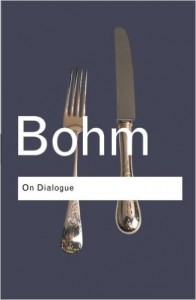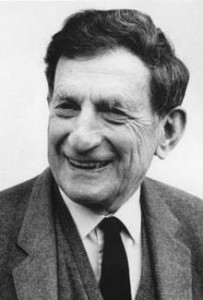 This relatively unknown little book by David Bohm, one of the great physicists of the 20th century, should be required reading for anyone serious about the question of personal and societal transformation.
This relatively unknown little book by David Bohm, one of the great physicists of the 20th century, should be required reading for anyone serious about the question of personal and societal transformation.
Edited by Lee Nichol, and consisting of essays as well as material from seminars and group meetings, On Dialogue explores the very nature of communication. It goes deeply into the nature of thinking, and how thoughts, feelings, and memories shape our reality.
Bohm, who has been greatly influenced by Krishnamurti, also explores the nature of collective thought, the relationship of the observer and the observed, the differences between problems and paradoxes and between literal and participatory thinking, and the relationship of thought to the body and proprioception.
Bohm makes it clear that communication is breaking down at every level of life—personal, family, societal, political, and so on—and that most of the efforts we make to prevent this breakdown only further “accelerate” it. Bohm makes a powerful case for his assertion that if communication between people, groups, and governments is to ever create a new understanding, it can only do so if “people are able freely to listen to each other, without prejudice, and without trying to influence each other.” One need only look honestly at oneself or others in today’s contentious world to see how rare such listening is.
The beginning of real communication, says Bohm, occurs when each of  us is able to come together with others and be aware together of the subtle fears, pleasures, and assumptions that block our “ability to listen freely.”
us is able to come together with others and be aware together of the subtle fears, pleasures, and assumptions that block our “ability to listen freely.”
Bohm maintains that we can learn how to listen through the practice of “dialogue,” which “comes from the Greek word diologos. “The picture or image that this derivation suggests is of a stream of meaning flowing among and through us and between us.”
In practicing “dialogue,” Bohm suggests that people organize themselves in groups of 30 or 40 people (a kind of microcosm of society) without either an agenda or a leader. In these conditions, talking about anything that interests us, we can begin to observe the deep assumptions in ourselves and others that block both internal and external communication and fragment our lives. Bohm points out that this fragmentation is built into the very way we think, and that only by experiencing without judgment “the movement of thought,” along with its underlying assumptions and paradoxes, in ourselves and others can a real transformation of consciousness begin.
For Bohm, however, this transformation must occur both individually and collectively. “It’s important that it happen together—it’s got to be both. And therefore the whole question—of…the ability to dialogue…to participate in communication—is crucial.”
Copyright 2009-15 by Dennis Lewis